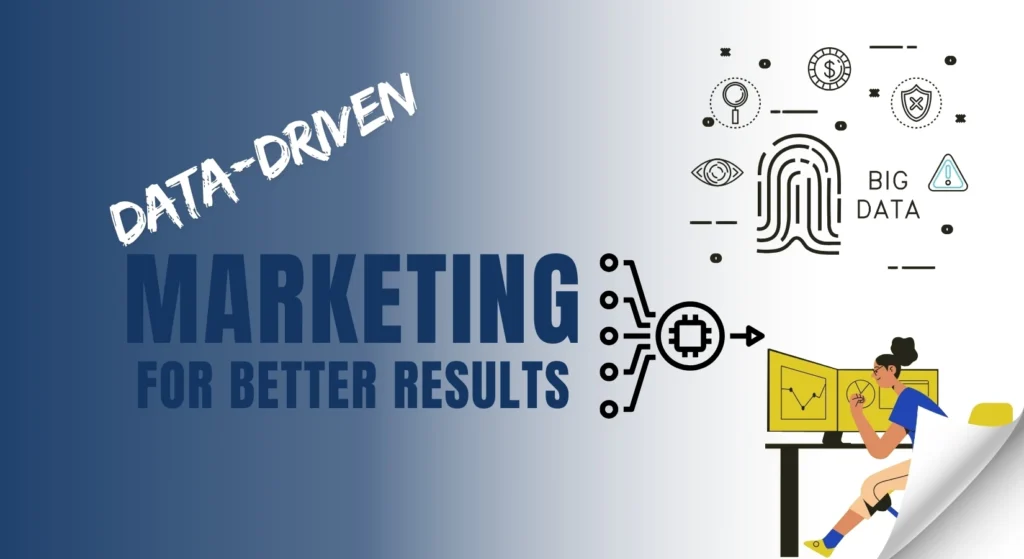In today’s competitive business environment, the ability to make informed decisions is crucial for success. Data-driven marketing can help businesses gain valuable insights into consumer behavior, optimize their marketing strategies, and ultimately achieve better results. In this article, we will explore the importance of using data in marketing, how to effectively leverage analytics, and the steps you can take to implement a data-driven approach in your marketing efforts.
The Power of Data-Driven Marketing
The Shift Towards Analytical Marketing
The marketing landscape has evolved dramatically in recent years. Traditional methods of marketing, which often relied on gut instincts and broad audience targeting, are no longer sufficient. The rise of digital technology and the proliferation of data have paved the way for a more analytical approach to marketing. Marketers now have access to an abundance of data from various sources, including social media, websites, email campaigns, and customer feedback. This data provides a wealth of information that can be used to make more informed and strategic marketing decisions.
Benefits of Leveraging Analytics in Marketing
Utilizing analytics in marketing offers numerous benefits. First and foremost, it enables marketers to better understand their target audience. By analyzing data related to consumer behavior, preferences, and demographics, businesses can create more personalized and relevant marketing campaigns. This not only improves engagement but also increases the likelihood of conversion.
In addition, analytics allows for the continuous optimization of marketing strategies. Digital marketing agencies can identify what is working and what is not, making it easier to adjust tactics and allocate resources more effectively. This iterative process leads to more efficient and cost-effective marketing efforts.
Finally, leveraging analytics helps businesses stay ahead of the competition. In a crowded marketplace, the ability to quickly adapt to changes in consumer behavior and market trends is a significant advantage. Data-driven insights enable businesses to respond to these changes in real-time, ensuring that their marketing efforts remain relevant and impactful.
How to Leverage Analytics for Better Results in Data-Driven Marketing
Identifying Key Metrics and KPIs
The first step in implementing a data-based marketing strategy is to identify the key metrics and key performance indicators (KPIs) that align with your business goals. These metrics will vary depending on the nature of your business and the objectives of your marketing campaigns. Common metrics include website traffic, conversion rates, customer acquisition costs, and return on investment (ROI).
Once you have identified the relevant metrics, it is important to set clear and measurable goals. For example, if your objective is to increase website traffic, you might set a goal of achieving a 20% increase in organic search traffic within six months. Setting specific goals provides a benchmark against which you can measure the success of your marketing efforts.
Collecting and Analyzing Data
With your metrics and goals in place, the next step is to collect data. This data can be gathered from a variety of sources, including website analytics tools, social media platforms, email marketing software, and customer relationship management (CRM) systems. The key is to ensure that you are collecting accurate and relevant data that will provide meaningful insights into your marketing performance.
Once the data has been collected, the next step is to analyze it. This involves examining the data to identify patterns, trends, and correlations that can inform your marketing strategy. For example, you might discover that certain types of content perform better on specific social media platforms or that certain demographics are more likely to convert into customers. These insights can then be used to refine your marketing tactics and improve overall performance.
Implementing Data-Driven Decisions
The ultimate goal of leveraging analytics is to make informed decisions that drive better marketing results. This involves taking the insights gained from your data analysis and applying them to your marketing strategy. For example, if your data analysis reveals that email campaigns with personalized subject lines have higher open rates, you might decide to incorporate more personalization into your email marketing efforts.
It is also important to continuously monitor and adjust your strategy based on the results. Data-driven marketing is an ongoing process, and it requires regular review and refinement. By staying agile and responsive to the data, you can ensure that your marketing efforts remain effective and aligned with your business goals.
Overcoming Challenges in Data-Driven Marketing
Data Quality and Integrity
One of the biggest challenges in data-based marketing is ensuring the quality and integrity of the data being used. Inaccurate or incomplete data can lead to misguided decisions and ineffective marketing strategies. To overcome this challenge, it is important to implement robust data management practices. This includes regularly cleaning and updating your data, as well as using reliable data sources and analytics tools.
Integrating Data from Multiple Sources
Another challenge is integrating data from multiple sources. In many cases, data is siloed across different platforms and systems, making it difficult to get a comprehensive view of your marketing performance. To address this issue, consider using data integration tools or platforms that can consolidate data from various sources into a single, unified view. This will enable you to gain a more holistic understanding of your marketing efforts and make more informed decisions.
Ensuring Privacy and Compliance
Data privacy and compliance are also critical considerations in data-driven marketing. With the increasing focus on data protection regulations, such as the General Data Protection Regulation (GDPR), it is essential to ensure that your data collection and usage practices comply with relevant laws. This includes obtaining the necessary consent from consumers and implementing security measures to protect sensitive data.
Frequently Asked Questions
1. What is data-driven marketing?
It is a strategic approach that involves using data and analytics to inform and optimize marketing decisions. By leveraging data, businesses can gain insights into consumer behavior, personalize marketing campaigns, and improve overall performance.
2. How can analytics improve marketing results?
Analytics allows marketers to track and measure the performance of their campaigns, identify trends and patterns, and make data-driven decisions. This leads to more effective and efficient marketing strategies, ultimately resulting in better outcomes.
3. What are some common challenges in data-based marketing?
Common challenges include ensuring data quality and integrity, integrating data from multiple sources, and maintaining compliance with data privacy regulations. Addressing these challenges is essential for the successful implementation of data-driven marketing.
4. What tools are commonly used in data-based marketing?
Common tools include Google Analytics, social media analytics platforms, CRM systems, and data integration tools. These tools help marketers collect, analyze, and act on data to improve their marketing efforts.
5. Why is data-based marketing important for businesses?
It is important because it enables businesses to make informed decisions, optimize their marketing strategies, and achieve better results. In a competitive market, leveraging data can provide a significant advantage.
Conclusion
Data-driven marketing is no longer a luxury but a necessity in today’s digital landscape. By leveraging analytics, businesses can gain valuable insights into consumer behavior, optimize their marketing strategies, and achieve better results. However, the successful implementation of data-based marketing requires a commitment to data quality, integration, and privacy. As businesses continue to embrace this approach, those that can effectively leverage data will be better positioned to thrive in an increasingly competitive market.



